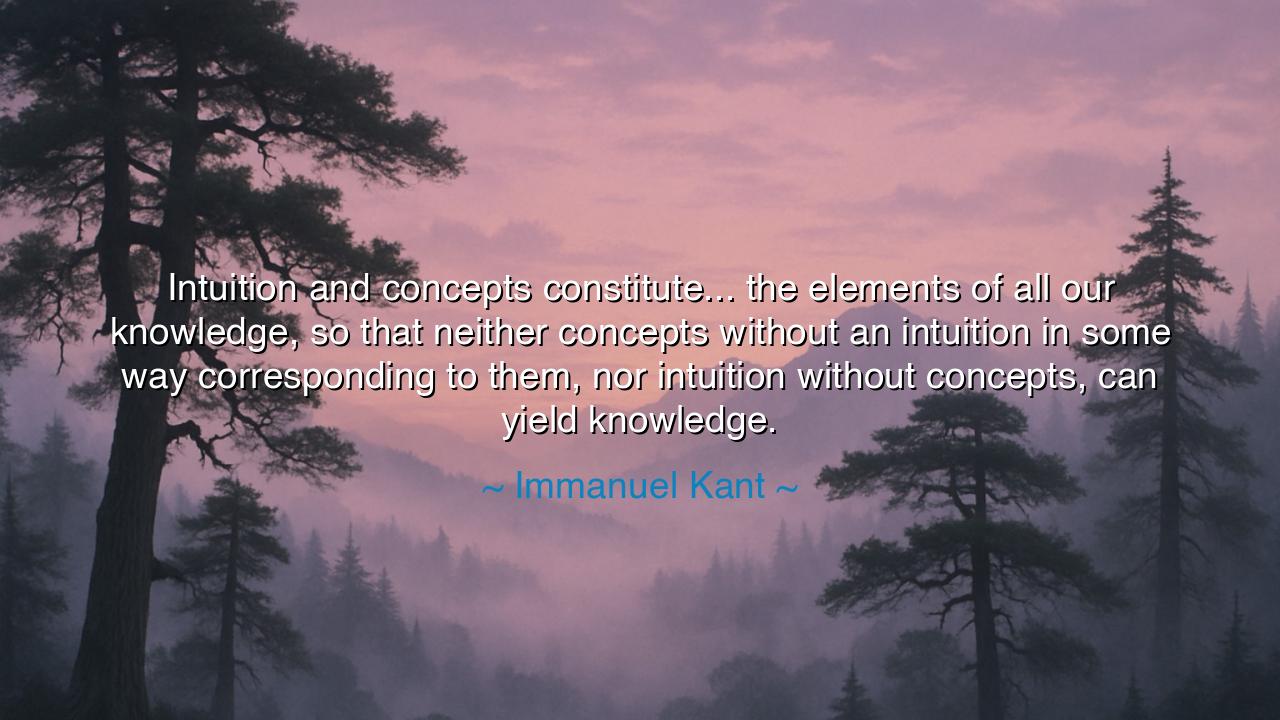
Intuition and concepts constitute... the elements of all our
Intuition and concepts constitute... the elements of all our knowledge, so that neither concepts without an intuition in some way corresponding to them, nor intuition without concepts, can yield knowledge.






Hear, O seeker of wisdom, the profound words of Immanuel Kant, sage of Königsberg and architect of modern philosophy: “Intuition and concepts constitute the elements of all our knowledge, so that neither concepts without an intuition in some way corresponding to them, nor intuition without concepts, can yield knowledge.” These are words of structure and spirit — the pillars upon which all true understanding stands. They remind us that the mind and the senses are not rivals, but companions in the eternal quest for truth.
The meaning of this quote lies in the union of two powers — intuition and concepts. By intuition, Kant does not mean mere instinct, but the immediate perception of reality — the raw experience of the senses, the world as it appears before thought shapes it. By concepts, he means the intellect’s patterns and categories — the ideas, language, and reasoning that give shape to what we perceive. The senses give us the material; the mind gives it meaning. Without one, the other is blind or empty. Thus, he declares that knowledge is born only when perception and understanding meet in harmony.
The origin of these words comes from Kant’s masterwork, The Critique of Pure Reason, written in the 18th century, when human thought was torn between two great camps — the empiricists, who believed knowledge came only through experience, and the rationalists, who believed it came from pure thought. Kant, standing like a bridge between them, forged what he called a Copernican revolution in philosophy: that the mind is not a passive mirror reflecting the world, but an active force shaping it. Thus, he united reason and experience, declaring that intuition gives us objects, while concepts give them form — and from this marriage arises knowledge itself.
To see this truth in life, one need only look to the discoveries of the human spirit. When Isaac Newton watched the apple fall, his eyes provided the intuition — the sight of a simple event. But it was his concepts, the mathematical and rational structures within his mind, that transformed that sight into a law of gravity. Had he seen but not thought, the apple would have been forgotten; had he thought but not seen, his equations would have floated without anchor. It was their union — the eye and the idea — that birthed knowledge.
So too in the world of art, invention, and love. The painter who sees the light on a distant hill has intuition, but without concept, his hand paints chaos. The philosopher who conceives of truth but never steps into the world of living experience knows only abstraction. And the lover who feels deeply but cannot understand, or who understands but cannot feel — both walk half-blind through life. Kant’s wisdom teaches balance: that to know truly, one must feel and think, perceive and comprehend.
This truth was known, too, to the ancients. Aristotle spoke of the soul as the form of the body, meaning that thought and perception complete one another. The mystics of the East taught that wisdom arises when the inner vision and the outer world align. Kant, in his own age, gave this ancient harmony a new philosophical form. He called upon humanity to rise above the quarrel between science and faith, reason and emotion, experience and intellect — to see that truth is the dance between what we see and how we see it.
And what lesson, then, shall you, traveler of thought, take from this? It is this: seek to unite the eye of the body and the eye of the mind. When you observe, do not rush to judge; when you reason, do not forget to feel. The world is both seen and understood — and to live fully, you must do both. Let your intuition feed your imagination, and let your concepts refine your vision. For knowledge that forgets experience becomes arrogance, and experience that forgets reflection becomes confusion.
So remember the wisdom of Immanuel Kant: that intuition without concepts is blind, and concepts without intuition are empty. Do not seek light only through thought, nor only through sensation, but through their union. For the truth, like the sun, reveals itself not to the eyes alone nor to the mind alone, but to the soul that has learned to see and to understand at once — the soul that walks the golden path between the world of matter and the realm of meaning.






AAdministratorAdministrator
Welcome, honored guests. Please leave a comment, we will respond soon